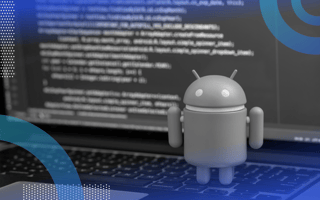Android development may involve several programming languages and there are four main components of an Android app that allow them to function.
Android Development: 4 Components of an Android App
- Activities
- Services
- Content providers
- Broadcast receivers
Which Language Is Used in Android Development?
Java is the official language used in Android development, with lines of code compiled on Dalvik Virtual Machines.
Most Android APIs are designed to work with Java, which is also the Android Studio’s natural coding language. That said, many other programming languages can be used by Android developers.
React Native app development has grown to become among the most popular ways of creating applications. This is because React Native allows developers to create apps for both iOS and Android using JavaScript and common UI frameworks to accelerate development. Additionally, C# combines the basics of C++ and Java to provide a high-level, but still useful, coding language to enable new coders to begin developing Android apps.
Developers also use C/C++, Kotlin, BASIC and Lua in Android development.
What Are the 4 Components of an Android App?
1. Activities
The single-screen user interface that acts as an entry point for the user to interact with an app is called the activity. Independent activities work together to form a cohesive user experience and are responsible for facilitating key interactions between the system and the app, such as keeping track of what is on the screen, to ensure the system continues running the process hosting the activity. This system prioritizes previously used processes so the user can return to them, thereby allowing apps to restore previous states after being killed and to implement user flows between each other.
2. Services
Services act as a general-purpose entry point for keeping an app running in the background while another application is in use or the user is not actively navigating the device. An example of a service is music playing in the background while a user is in another app. There are two types of services:
- Started services, which keep an app running in the background until its process is completed
- Bound services, which keep running because another app or the system is making use of it to function
3. Content Providers
A content provider manages shared sets of data that can be stored in the file system and later accessed by an app. Content providers allow approved apps to query or modify data. An example would be a content provider that manages a user’s contact information and allows apps with the proper permissions to query the content provider as well as read and write information about a particular contact.
4. Broadcast Receivers
A broadcast receiver allows the system to deliver events to an app outside of its regular user flow, such as system-wide broadcast announcements. An example of this is an app scheduling an alarm that notifies the user of an upcoming event. The app can deliver that alarm to the broadcast receiver, which allows it to close until the alarm goes off. Broadcasts often come from the system itself, alerting users to things like shutdowns, low battery levels or when a picture has been taken.
How Are Android Apps Developed?
Android Studio is the official, unified, integrated development environment (IDE) for building apps designed to run on Android devices. The platform offers app developers structured code modules to divide projects into units of functionality for independent building, testing and debugging.
The Android Studio environment is based on Intellij IDEA to facilitate fast turnarounds and a streamlined workflow, capable of intelligent code editing with advanced code completion, refactoring and code analysis, a feature-rich emulator, code templates, a layout editor and more.





